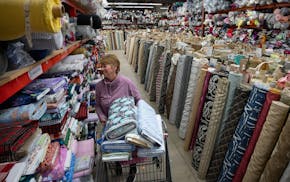Opinion editor's note: Strib Voices publishes a mix of commentary online and in print each day. To contribute, click here.
•••
Last week, the Trump administration listed the proposed NorthMet copper-nickel mine in northeastern Minnesota among federal mineral priorities. To some, this is evidence that this mine will open soon.
It is not.
I've been researching more than 140 years of Minnesota mining history for the last two decades. I've also poked around the origins of copper mines in Michigan and Arizona. It's a complicated business with a simple motive: profit.
Markets and cost drive mining ventures. Taxes, environmental regulations and public opinion matter only to the degree they affect markets and cost.
When Charlemagne Tower and his son opened the Vermilion Iron Range, they had to find ways to get the ore to Lake Superior. Ditto for Leonidas Merritt, along with his brothers and cousins, when they opened the larger Mesabi Range. The Towers confronted hard rock. The Merritts built a railroad through a dismal swamp.
Pioneers took on the bigger risk before being muscled out by big money, manifested in the creation of U.S. Steel in 1901.
It's true that they didn't have pesky environmentalists in the way back then, but they also mined with picks and shovels instead of today's efficient machinery and transportation systems.
NewRange Minerals owns the NorthMet project, which would be located at the site of the former LTV taconite mine in Hoyt Lakes. You might know it by its previous name, PolyMet. With global giants Glencore and Teck Resources funding its development, NewRange has the kind of backing that could build a mine. It also cites demand for the minerals. This new federal designation certainly won't hurt its chances.
But the problem that has beguiled this project since 2001 is that the proposal on paper has never matched the commercially viable scale the project would need to succeed. It could, but that would mean telling state regulators exactly how much earth would be turned and what kind of mitigation would be necessary as a result.
NewRange announced recently it would soon resubmit permit applications that were denied last year.
Make no mistake. The mining companies could tell the whole truth, commit to financial assurances, and get the permits. But being coy costs much, much less. That's important when the cost analysis runs tighter than boastful news releases would otherwise indicate.
That leads to a related problem. If Trump wants copper-nickel mining in Minnesota, he will need to stop tanking the economy.
Even if we attempt to source these minerals in the United States whenever possible, the prices that customers pay will still be determined by supply and demand. If the U.S. revs up demand by closing foreign markets, our supply won't last long. Meantime, consumers will pay even higher prices.
Likewise, continued economic stagnation will smother prospects for mines everywhere. Why did Tower and the Merritts lose their budding empires to John D. Rockefeller and friends? The economic downturn of the 1890s. Why did the economy tank in the 1890s? Excessive tariffs.
To paraphrase an apt phrase, we've been fouling around, but we are only beginning to find out. If you want domestic mining, you need a stable domestic economy full of people who can afford mined goods.
On the other side of the issue, we owe future generations accountability for our decisions. If we use up all our domestic resources, we will be asked if we used them wisely. If we leave a mess for our great-grandchildren, they won't care about our excuses, nor should they. It is fashionable in certain bars or Facebook groups to mock anyone who brings this up. But it is true even if, especially if, we support mining.
As with most other issues these days, we can only count on the federal government for noise. It will be up to Minnesota to apply appropriate standards upon the mining industry. That's a heavy responsibility that won't be borne easily.
As for the prospects of NewRange Minerals, or any other mining project in Minnesota, we should become excited only when the accounting ledgers match the claims spurting out from the public relations office. This is hardly new advice and applies equally well to politics.
Brown: Relying on law enforcement to solve mental health crisis puts lives at risk
Brown: The good, bad and ugly of Trump's blessing U.S. Steel, Nippon deal

Brown: As once-giant Joann Fabrics shutters its doors, the DIYers must sew our economy back together

